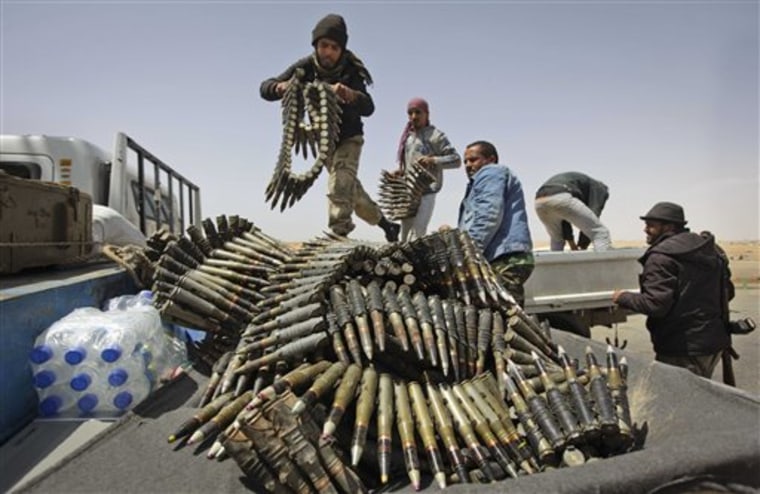Moammar Gadhafi's forces shelled the eastern edge of Ajdabiya Sunday, bringing the fight to the front-line rebel town that has been the scene of fierce fighting in recent weeks.
Loud booms rocked the city throughout the morning, sending a column of cars — some with rebel fighters, others with families — fleeing north through a thick sandstorm to more securely held rebel territory.
Rebel forces fired back with rockets and no government forces entered the city, said rebel fighter Awad Sathi.
The government strikes highlight the rebels' inability to hold territory along the desert road to the city's east where weeks of fighting has seen neither side able to make significant advances.
Rebels acknowledged the setback a day after claiming they had reached the outskirts of the oil town of Brega, about 60 miles (100 kilometers) to the west.
"The situation is hard here, and we don't really know who is holding what," Sathi said Sunday night.
Last week, a government force of tanks and armed pickup trucks rushed the city, a few of them entering before airstrikes from the NATO force enforcing a no-fly zone stopped the advance.
Mohammed Idris, a hospital supervisor in Ajdabiya, said Gadhafi's forces appeared to have advanced on the city in the morning, firing on its eastern flank. Rebel reinforcements reached the town in the afternoon, firing back with their own rockets from two spots on the outskirts, he said.
Idris said only one of the government's strikes hit the city, a mortar round that fell in a deserted residential neighborhood. No dead fighters were brought to the hospital, he said, although a few received minor injuries.
The NATO-led air campaign has kept rebels from being defeated on the battlefield by the better trained and equipped government forces, but it still has not been enough to turn the tide. The rebels have been unable to reach Gadhafi's heavily defended hometown of Sirte, the gateway to the regime-controlled western half of the country.
Rebel advances west of Ajdabiya — through Brega and its companion oil center of Ras Lanouf, another 60 miles (100 kilometers) farther on — have ultimately foundered as rebels overextended their supply lines and were routed by the heavier firepower and more sophisticated tactics of the government forces.
But while Gadhafi's troops have been able to halt rebel advances and push back east, they have been unable to move in on Benghazi, largely because of the threat of NATO airstrikes on Gadhafi's exposed forces.
In Paris, French Defense Minister Gerard Longuet dismissed statements from a top NATO official that the alliance is short of aircraft. Longuet said instead that NATO's mission in Libya is hampered by a lack of ground information.
"There is no lack of planes but a lack of identification of mobile objectives," he said in an interview published Sunday in the daily Le Parisien. "The problem is that we're missing concrete and verifiable information on identified objectives on the ground."
Longuet said that "coalition aviation is capable of breaking all logistical provisions of Gadhafi's troops" to the east. But he acknowledged that in urban combat, "if the aviation avoids tragedies, it still isn't solving the problem."
After a meeting of NATO foreign ministers last week in Berlin, the alliance's secretary-general, Anders Fogh Rasmussen, said NATO needed "a small number of precision aircraft" to hit Gadhafi's forces.
"I'm hopeful that nations will step up to the plate," he said, noting that the two-day Berlin meeting was not held to solicit new pledges of support.
The need for the additional aircraft comes as the situation has changed on the ground, Fogh Rasmussen said.
The Libyan government has come under sharp international criticism for its assault on Misrata and has been accused by human rights groups of using heavy weapons, including shells, missiles and cluster bombs. Such bombs can cause indiscriminate casualties and have been banned by many countries.
In Tripoli, Libyan government spokesman Moussa Ibrahim denied the allegations, telling a small gathering of foreign diplomats: "Don't believe the lies."
"Don't believe that the Libyan army attacks civilians," Ibrahim said.
"We would never bombard our cities or our people. It is against our morals and our religion. The Libyan army are the Libyan tribes and they would never kill their own sons and daughters or bombard Zawiya, Zuwara, Benghazi or Misrata," he said, referring to cities where battles have or are being fought.
Journalists on the eastern front have reported heavy shelling by pro-Gadhafi troops with both artillery and missiles, while reporters who have entered Misrata have also described the use of heavy weapons by government forces in the city.
Late Saturday, Maj. Gen. Saleh Ibrahim denied Libyan forces have used cluster bombs, saying the army did not have such weapons and that Libyan soldiers had not been trained in their use.
___
Associated Press writer Karin Laub contributed to this report from Tripoli, Libya.
